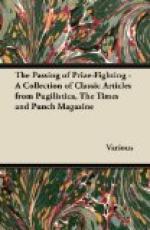George. That cannot have been very good for the cooking.
Mrs. M. The daughters of the family were seldom educated at home, and when they returned to their father’s roof their parents were only admitted into the presence of their children during short and stated periods.
Mary. And when did the English begin to grow kinder to their parents?
Mrs. M. I really cannot say. Perhaps a climax was reached in the Baby Suffrage Act; but after that matters began to improve, and the Married Persons Amusements Act showed a more tolerant spirit towards the elderly. But even so lately as when my mother was a child young people were often exceedingly harsh with their parents, and she has told me how on one occasion she locked up her mother for several hours in the coal-cellar for playing a mouth-organ in the bathroom without permission.
Richard. Pray, Mamma, did the English speak Irish then, as they do now?
Mrs. M. Compulsory Irish was introduced under ALFRED as a concession to Ireland for the services rendered by that kingdom to art and literature and the neutrality which it observed during England’s wars. There was a certain amount of opposition, but it was soon overcome by ALFRED’S wisely insisting on the newspapers being printed in both languages. Since then the variations in dialect and pronunciation which prevailed in different districts of England have largely disappeared, and from Land’s End to John o’ Groat’s the bilingual system is now securely established, though my mother told me that as a child she once met an old man in Northumberland who could only speak a few words of Irish, and had been deprived of his vote in consequence.
Richard. What were the Thirty-Nine Articles? I don’t think I ever heard of them before.
Mrs. M. When you are of a proper age to understand them they shall be explained to you. They contained the doctrines of the Church of England, but were abolished by Archbishop WELLS, who substituted seventy-eight of his own. But as Mary is looking tired I will now conclude our conversation.
* * * * *
THE MOTH PERIL.
["Fruit growers are warned
to be on their guard against
the wingless moth, for lime-washing
the trees is almost
useless.”—Evening
Paper.]
If the brute ignores the notice, “Keep off the trees,” order him away in a sharp voice.
Sulphuric acid is a most deadly antidote; but only the best should be used. If the moth be held over the bottle for ten minutes it will show signs of collapse and offer to go quietly.
This pest abhors heat. A good plan is to heat the garden-roller in the kitchen fire to a white heat and push it up the tree.
A gramophone in full song, is also useful. After a few minutes the moth will come out of its dug-out with an abstracted expression on its face, and commit suicide by jumping into the mouth of the trumpet.




